
African Lion Safari is a family-owned safari park in Southern Ontario, Canada, straddling the cities of Hamilton and Cambridge, located 100 kilometres (62 mi) west of Toronto. Guests may tour seven game reserves, with a total area of about 740 acres, on tour buses or in visitors' own vehicles, where animals roam freely in contained areas. Accompanying the game reserves is a walking section where exotic birds and primates, as well as the park's herd of Asian elephants, are on display.
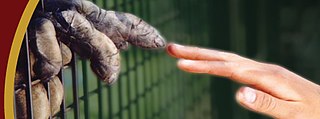
The Great Ape Project (GAP), founded in 1993, is an international organization of primatologists, anthropologists, ethicists, and others who advocate a United Nations Declaration of the Rights of Great Apes that would confer basic legal rights on non-human great apes: chimpanzees, bonobos, gorillas, and orangutans.
Cruelty Free International is an animal protection and advocacy group that campaigns for the abolition of all animal experiments. They organise certification of cruelty-free products which are marked with the symbol of a leaping bunny.

Friends of Animals (FoA) is a non-profit international animal advocacy organization, established in New York City in 1957, working to free animals around the world from cruelty and institutionalized exploitation. The organization's headquarters is in Darien, Connecticut, with an additional office in Colorado.
The Born Free Foundation is an international wildlife charity that campaigns to "Keep Wildlife in the Wild". It protects wild animals in their natural habitat, campaigns against the keeping of wild animals in captivity and rescues wild animals in need. It also promotes compassionate conservation, which takes into account the welfare of individual animals in conservation initiatives.

The Humane Society of the United States (HSUS) is an American nonprofit organization that focuses on animal welfare and opposes animal-related cruelties of national scope. It uses strategies that are beyond the abilities of local organizations. It works on issues including companion animals, wildlife, farm animals, horses and other equines, and animals used in research, testing and education. As of 2001, the group's major campaigns targeted factory farming, animal blood sports, the fur trade, puppy mills, and wildlife abuse.
The International Primate Protection League (IPPL) is an animal rights and welfare organization founded in 1973 in Thailand by Dr. Shirley McGreal, OBE.

Primarily Primates (PPI) is a non-profit organization in Bexar County, Texas, that operates an animal sanctuary, housing 347 non-human primates and a variety of other birds and animals released from use in entertainment, research, or as rescues from the exotic pet trade. The organization was founded by Wallace (Wally) Swett in 1978, who ran the facility until 2006, when the Texas attorney general took control of it after allegations that were dismissed that the facility was an unfit place for animals. It has since been passed to new management, and operates in 2018, with a $1.1 million dollar budget. Primarily Primates employs 16 people for management and care staff, and a full-time veterinarian to assure high standards, excellent animal care and rescue, enrichment, and nutrition.
The Performing Animal Welfare Society (PAWS) is a U.S.-based group for abandoned or abused performing animals as well victims of the exotic animal trade. They claim 30,000 members. As a member accredited by The Association of Sanctuaries (TAOS), the society follows guidelines stipulated by TAOS, one of which is that none of the elephants be bred.

Austin Zoo is a non-profit rescue zoo and located in southwestern unincorporated Travis County, Texas, United States, west of Austin. The zoo is accreddited by the Zoological Association of America.

In Defense of Animals (IDA) is an animal protection organization founded in 1983 in San Rafael, California, USA. The group's slogan is "working to protect the rights, welfare, and habitats of animals".
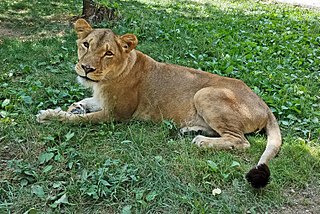
The Black Pine Animal Sanctuary is an 18-acre (7.3 ha) exotic animal sanctuary located in Albion, Indiana, United States.
Women have played a central role in animal advocacy since the 19th century. The animal advocacy movement – embracing animal rights, animal welfare, and anti-vivisectionism – has been disproportionately initiated and led by women, particularly in the United Kingdom. Women are more likely to support animal rights than men. A 1996 study of adolescents by Linda Pifer suggested that factors that may partially explain this discrepancy include attitudes towards feminism and science, scientific literacy, and the presence of a greater emphasis on "nurturance or compassion" amongst women. Although vegetarianism does not necessarily imply animal advocacy, a 1992 market research study conducted by the Yankelovich research organization concluded that "of the 12.4 million people [in the US] who call themselves vegetarian, 68% are female, while only 32% are male".
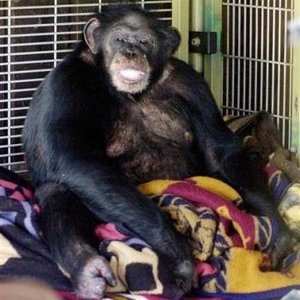
Travis was a male common chimpanzee who, in February 2009, mauled a friend of his owner in Stamford, Connecticut, blinding her while severing several body parts and severely lacerating her face. He was shot dead when he tried to attack a police officer.
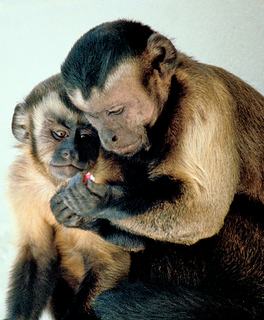
An exotic pet is a pet which is relatively rare or unusual to keep, or is generally thought of as a wild species rather than as a pet. The definition varies by culture, location, and over time—as animals become firmly enough established in the world of animal fancy, they may no longer be considered exotic.
The New England Anti-Vivisection Society (NEAVS) is a national, registered 501(c)(3) nonprofit organization “dedicated to ending the use of animals in research, testing, and science education” and replacing them with "modern alternatives that are ethically, humanely, and scientifically superior."

Bush Babies Monkey Sanctuary is a privately owned multi-species primate rehabilitation centre situated in the foothills and gorges of the Magaliesberg mountain range, close to Hartbeespoort Dam in the North West Province of South Africa.
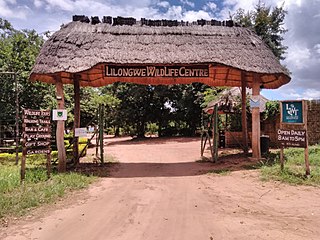
The Lilongwe Wildlife Centre is a wildlife sanctuary in Lilongwe, Malawi. It was founded in 2007 by the Lilongwe Wildlife Trust (LWT), with support from the Born Free Foundation. The Centre is a member of the Pan African Sanctuary Alliance.
Animal welfare and rights in Switzerland is about the treatment of and laws concerning non-human animals in Switzerland. Switzerland has high levels of animal welfare protection by international standards.
International Primate Day, September 1, is an annual educational observance event organized since 2005 largely by British-based Animal Defenders International (ADI) and supported annually by various primate-oriented advocacy organizations, speaks for all higher and lower primates, typically endorsing humane agendas where primates are at risk, as in research institutions or species endangerment in precarious environmental situations.












